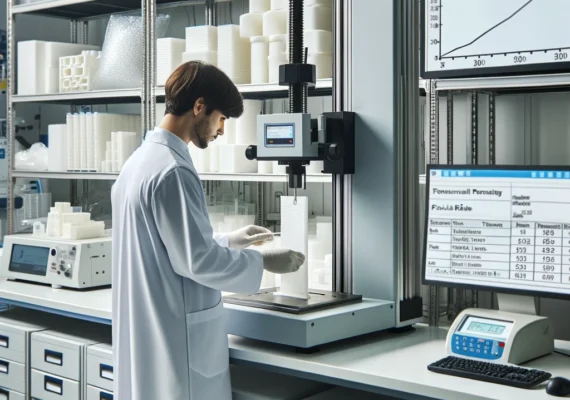
Why Plastic Material Testing Matters: Plastic material testing is essential for multiple reasons. It helps manufacturers understand the properties of their materials, predict product performance under various conditions, and ensure compliance with regulatory standards. Testing also plays a pivotal role in research and development by providing insights that can lead to innovations in material composition and application.
Comprehensive Testing Services at Kiyo R&D Center & Laboratory:
Tensile Testing: Tensile tests are fundamental for assessing the mechanical strength of plastic materials. By applying a controlled tension until the material breaks, we can obtain critical data on its strength, elongation, and modulus of elasticity. This test helps in predicting how a material will behave under force in real-world applications.
Flexural Testing: Flexural or bending tests are crucial for materials expected to withstand bending forces. This test measures the force required to bend the plastic and helps determine its stiffness and flexibility, which are vital for applications across various industries, including construction and automotive.
Flammability Testing: Safety is paramount, especially when it comes to materials prone to catching fire. Our flammability tests evaluate how quickly a plastic ignites and spreads flames, enabling manufacturers to enhance their product safety features.
Filler/Ash Content Testing: Determining the filler content of plastics is essential for understanding their mechanical properties and ensuring quality. Fillers can significantly influence the strength, weight, and heat resistance of plastic products.
Advanced Analytical Techniques: We employ sophisticated analytical methods such as SEM (Scanning Electron Microscopy), FTIR (Fourier Transform Infrared Spectroscopy), and DSC (Differential Scanning Calorimetry). These techniques provide deep insights into the microscopic and thermal properties of plastics, aiding in the identification of materials and analysis of their thermal behavior.
Industry Applications: Our testing services cater to a wide range of industries. In the automotive sector, we help companies develop safer and more durable plastics for car parts. In the field of healthcare, our tests ensure that the plastic used in medical devices adheres to the highest standards of safety and effectiveness.

Answer : Plastic material testing involves various methods and processes used to determine the physical, chemical, and mechanical properties of plastic materials. This testing ensures that plastics meet specific standards and are suitable for their intended uses.
Answer : Testing is essential to ensure that plastic products are safe, durable, and compliant with global standards. It helps manufacturers improve product design, meet regulatory requirements, and avoid costly recalls or legal issues.
Answer : We test a wide range of plastics including, but not limited to, ABS, polyethylene, polypropylene, nylon, PVC, PTFE, PET, and various engineering and specialty polymers.